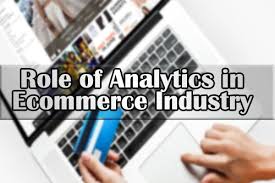
Predictive analytics plays vital role in managing demand and supply of the products featured on online retail stores. Predictive analytics will help e-commerce businesses better plan and forecast sales, improve sourcing, order fulfillment and delivery for customers.
Predictive Analytics provides e-commerce businesses with a deeper understanding of customer habits and preference
To achieve success in a highly dynamic market, e-commerce businesses must be able to stay one step ahead of their customers. They must be able to predict what customers are looking for on their e-commerce Store.
Predictive search capabilities that can be built-in to your analytics solution will allow e-commerce businesses to analyze their past click-through behaviors, shopping history, and product preferences, in real time.
Predictive analytics will allow continuous analysis of customer data, while Machine Learning capabilities will provide the most relevant results and recommendations to users.
Many predictive analytics solutions are being made available for on-cloud deployment, which is compatible with multiple e-commerce platforms.
Not all customers will interact with an e-commerce Store in the same way. Every customer is unique and their online behavior will differ based on individual tastes and preferences. Predictive analytics helps to assess different variable elements in a customers’ behavior. This will generate the desired engagement and responses from the customer, making their e-commerce experiences highly personalized.
Using predictive analytics capabilities that are built-in to a comprehensive analytics solution will allow e-commerce business to boost sales and conversions by running targeted campaigns to promote products among different audience or customer segments.
Predictive analytics can also help an e-commerce business decide the optimum prices for their products through an effective analysis of customer sentiments regarding pricing.
E-commerce businesses can harness the potential of predictive analytics to offer enhanced product recommendations and promotions
Similar to how a sales representative might make personalized recommendations to prospective customers in a physical retail store, customers on e-commerce stores are no different in their expectations. In this increasingly digital age, where a majority of customers prefer to shop online from the comfort of their homes or offices, relevant product recommendations have fast become a primary factor in the success of an e-commerce business.
To ensure a healthy conversion rate on their e-commerce stores, online retailers are making concentrated efforts to improve product recommendation capabilities on their e-commerce platforms. By harnessing the potential of predictive analytics, online retailers can gain relevant insights about individual customers. This will help them to offer targeted product recommendations, based on analysis of past shopping history, store browsing patterns and most popular products or items within a specific price range.
Predictive analytics, coupled with advanced Machine Learning capabilities can correlate data from different sources to create personalized recommendations for particular customers or segments.
Machine Learning capabilities that are built-in to the analytics solution can closely study a customer’s online behavior, judge the popularity of different products on the e-commerce store to provide highly curated and personalized product recommendations, thereby increasing the probability of generating a successful conversion.
Predictive analytics can also help e-commerce businesses drive targeted promotions to their customers, by closely analyzing campaigns that have worked well in the past. Promotions can be offered to relevant customer segments in real-time to encourage customers to complete a purchase or even to retrieve an abandoned shopping cart.
International retail chain Macy’s has positively harnessed the benefits of predictive analytics by using an analytics solution that offers enhanced targeting of registered users of their website.
In the first 3 months after the implementation of its analytics solution, Macy’s recorded an 8–12% increase in online conversions.
Predictive analytics enables e-commerce businesses to enhance pricing models
The online retail market is extremely competitive. It is an understatement to say that e-commerce stores must offer the best prices to ensure sales. Pricing products in online retail are very important to ensure the success of a brand.
E-commerce businesses must be constantly vigilant to monitor the pricing of the products on their stores. E-commerce stores must continually predict trends in product prices, taking advantage of festivals or periods of high visitor traffic on their e-commerce store. With the use of predictive analytics, e-commerce businesses can create enhanced product pricing models, determining the optimum prices to effectively maximize conversions. Predictive analytics capabilities in a robust analytics solution can analyze historical data for different products, analyze customer responses to past pricing trends, and evaluate competitor pricing, to build suitable pricing models for e-commerce businesses.
Predictive analytics helps e-commerce businesses to minimize fraud
Online retail is highly susceptible to occurrences of fraud and this is a key factor that hinders a large percentage of online shoppers from completing purchases on e-commerce stores. The possibility of fraud and online payment failure is one of the leading factors that result in shopping cart abandonment.
The implementation of an analytics solution that also offers predictive analytics can reduce online credit card fraud and allow a higher possibility of successful conversions. This can be achieved through the analysis of customer behavior and product sales. E-commerce businesses can use predictive analytics to learn which product categories are most susceptible to fraud and manage them accordingly.
Predictive analytics that is customized for fraud management can identify any potential fraud before the completion of the customer’s transaction. This will effectively reduce credit card payment failure, resulting in an increased number of successful conversions.
Predictive analytics essentially analyzes browsing patterns, payment methods and customer buying patterns to minimize and eliminate fraud. The combination of predictive analytics with Machine Learning capabilities can enable e-commerce businesses to define rules and automate fraud detection and prevention.
Thus, the implementation of predictive analytics on your e-commerce store’s data can ensure a more secure online retail experience as well as increased conversions and sales.
Predictive analytics offers effective supply chain optimization opportunities for e-commerce businesses
Predictive analytics enables e-commerce businesses to understand what products customers are looking for, helps in identifying popular and not-so-popular products and product categories. Predictive analytics can play an important role in managing demand and supply of the products featured on online retail stores.
Predictive analytics will help e-commerce businesses better plan and forecast sales, improve sourcing, order fulfilments and delivery for customers. This will go a long way in improving the overall customer experience and boost customer satisfaction with an e-commerce brand.
If e-commerce businesses can effectively harness predictive analytics in their supply chain management process, they can even predict revenues from certain products or product categories and avoid undesirable situations where products might be listed as unavailable or out-of-stock.
Predictive analytics allows e-commerce businesses to make critical business decisions faster
Predictive analytics for e-commerce businesses can help them better understand customer expectations, personal preferences, and retail trends. Predictive analytics offers e-commerce businesses more advanced business intelligence and valuable real-time insights.
With predictive analytics capabilities, e-commerce businesses will be able to assess various products featured in their stores and set suitable prices that will encourage sales and conversions.
Predictive analytics, therefore, enables e-commerce businesses to make faster, more relevant critical business decisions that will have a positive impact on business performance.
Predictive analytics is crucial to the success of e-commerce businesses
The implementation of predictive analytics as a part of the analytics solution employed by e-commerce businesses can result in a massive competitive advantage for e-commerce retailers. However, before final deployment, predictive analytics models must be thoroughly tested to ensure they function as expected.
E-commerce businesses must also closely monitor predictive analytics models periodically, to minimize the possibility of errors in data analysis.
IQLECT’s robust real-time data analytics solution, integrated with the Shopify platform, comes built-in with enterprise-grade predictive analytics capabilities and taps the potential of advanced Machine Learning and Artificial Intelligence features to give e-commerce businesses a chance to boost conversions by up to 80%.


















